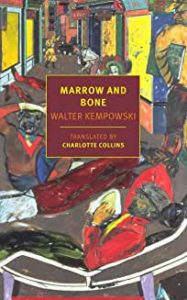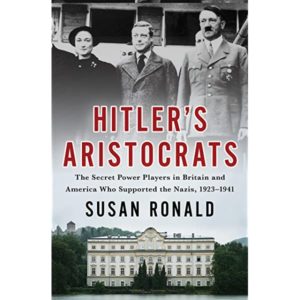Jonathan Fabrizius is a journalist living comfortably in 1980s Hamburg thanks to a rich uncle, but his thoughts often turn to the Nazi years and the end of WWII when his family fled East Prussia. His mother died in a cart giving birth to him and that death and the chaos of flight sometimes seem more real than the life he’s living.
Out of the blue, he gets an assignment to travel in a luxurious new Japanese car into former East Prussia to report on local culture while the driver and another passenger record the route for a future rally. And the fee is tremendous: 5,000 marks with negotiable expenses.
As he thinks of it, “his job was to write an article about the cultural riches of the People’s Republic of Poland.” Given that he’s traveling through a once-German region that was called Masuria, despite new Polish names for towns, those riches don’t seem very Polish or even much in evidence. He’s most impressed by a massive medieval fort built by the Teutonic Knights and a huge Gothic redbrick church. Such churches in northern Europe are his obsession.
The tone of dark and sometimes bizarre humor is set almost immediately by the work his Swedish girlfriend is doing to curate a museum exhibition on cruelty. She’s gathering materials about massacres and torture with a museum director who actually believes that excessive “pedantry” can be a form of “secondary” cruelty–and so can hit-and-run accidents.
There are no accidents on Jonathan’s off-kilter road trip, but it’s broken up by an unexpected robbery, encounters with curious peasants and obnoxious German tourists, meals that are inconsistent or not available, shabby hotels, and Jonathan’s travel companions. They work for the car company: Hansi is a famous race car driver with epic adventure stories behind him and chatty Frau Winkelvoss wears twenty-six necklaces, harem pants and a blizzard of scarves as she and Hansi help record the route in meticulous detail. Their “map” will guide drivers in some future rally.
Jonathan’s snark is his shield against feeling anything much at all. A typical observation: When Frau Winkelvoss can’t get good coffee at a Polish café he notes “Presumably during the war there wouldn’t have been any coffee here under the Germans either.”
The trip into his past (and Germany’s) challenges and then slowly strips away his sarcasm as he comes closer and closer to where his parents died and to an infamous concentration camp–that he can’t get into.
In Europe Kempowski is considered one of Germany’s greatest postwar writers but I hadn’t heard of him until I was on a book tour for the memoir My Germany and a professor said I had to read his book Have You Ever Seen Hitler? It’s based on interviews with people who lived through the rise and ruin of Nazi Germany and had wildly different opinions of their Fuehrer. The book is a stunning record of a country where many people worshiped Hitler like a god,.
Equally stunning is the richly layered and detailed novel All for Nothing, set in an East Prussian manor house whose inhabitants see waves of refugees fleeing the Russian troops. That book and this one have particular bite because Kempowski apparently himself witnessed waves of refugees as a teenager near the end of WWII.
Marrow and Bone is a sobering meditation on memory, forgetting, and the price paid for both.
Lev Raphael is the author of The German Money and twenty-six other books in many genres.




